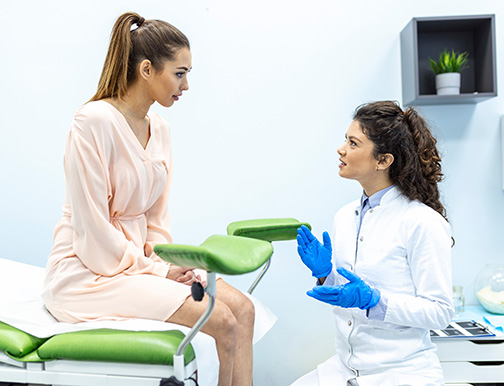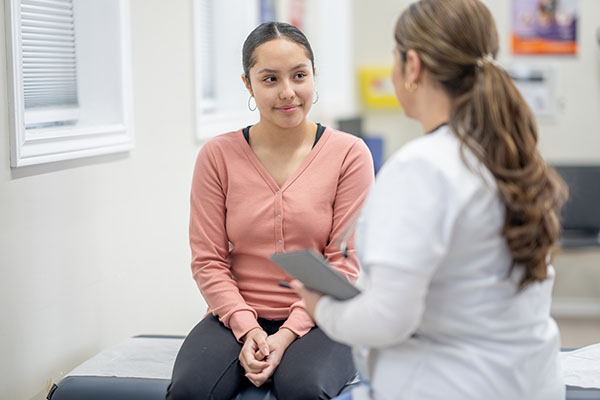Nervous to Get a Pap?
How to Make Cervical Cancer
Screenings More Comfortable
By Kristy Warren
Cervical cancer is one of the leading cancers impacting women’s health. The good news is it’s highly treatable when detected early and can often be prevented by acting quickly on pre-cancerous cells.
A cervical cancer screening, also known as a pap smear or pap test, is aimed at identifying pre-cancerous cells before you’re experiencing any symptoms and treating them to stop cervical cancer from developing. They can provide life-saving care, but due to anxiety, discomfort, or embarrassment about this exam, some patients skip or delay this screening, which gives trouble more time to brew.
Our women's health experts outline why cervical cancer screenings are so important and the steps you can take to make a pap test feel less daunting if you're nervous about this screening.
What is Cervical Cancer?
Cervical cancer forms in the tissues of your cervix, the part of your body that connects your uterus and vagina. Because this type of cancer is typically slow-growing, patients may not experience any noticeable symptoms until the cancer has significantly progressed. This makes preventive screening tools especially important.
Preventing Cervical Cancer:
Cervical cancer is almost always caused by the human papillomavirus (HPV). There are many different strains of HPV, and some are more likely to cause cancer than others. Two of the most important ways to prevent cervical cancer are pap tests and the HPV vaccine.

Cervical cancer screenings can detect abnormalities and pre-cancerous cells so that they can be treated and removed before they have a chance to develop into cancer.
The HPV vaccine is designed to help your body identify and better fight off the most high-risk HPV strains to lower your risk of developing cervical cancer and oropharyngeal cancer.
When You Should Get Screened:
A cervical cancer screening or “pap” is an outpatient procedure where a health professional collects and evaluates the health of your cervical cells. This screening can catch trouble at the start before cancer can develop or significantly progress.
Pap tests are covered at no cost by most insurances. If you don’t have insurance, there are programs available to provide you access to free or low-cost cervical screenings. Women should still talk to their doctor about cervical cancer screenings if they have had a partial hysterectomy.
- Start screening at age 21. You should schedule your first pap test regardless of whether or not you’re sexually active because it helps establish a healthy baseline.
- For women aged 21 – 29, pap tests are recommended every 3 years.
- For women aged 30 – 65 at average risk, pap tests are recommended every 5 years.
- Women over age 65 should be screened based on their cervical health history and personal risk. If you are over 65 and considered low risk for developing cervical cancer with a steady history of normal cervical screenings, your provider may discontinue testing.
Your healthcare provider may recommend more frequent testing if you have an abnormal test result, a weakened immune system, certain health conditions, a family history of cervical cancer, or previously had pre-cancerous cells or cervical cancer.
What to Expect During the Test:
During your cervical screening, your healthcare professional will talk to you about your health and any questions, symptoms, or concerns you may have. They will visually examine your body, and when you’re ready, will conduct the pap test.
Your provider will use use a tool called a speculum to open your vagina in order to better access your cervix and then gently collect some cervical cells using a small, brush-like tool. This part of the exam typically only takes a minute or two. These collected cells will then be sent to a lab and evaluated under a microscope for pre-cancerous or cancerous cells.
In addition to discussing your health and taking cervical cell samples, your healthcare provider may also perform a pelvic exam. A pelvic exam involves your provider palpating your abdomen with their hands to check the size, shape, and position of your uterus and ovaries. This physical exam can help your provider diagnose if anything feels different that may require imaging or further testing.
How to Make Cervical Screenings More Comfortable:
Pap tests can seem daunting or even a little scary, especially when you have never had one and aren't sure what to expect or have negative memories about a prior test. For some women, cervical screenings are painless. Others may experience mild to moderate discomfort or embarrassment. Some people can even find the test stressful or painful—particularly those who have experienced sexual trauma, suffer from vaginal dryness, had a poor previous screening experience, or have certain medical conditions like endometritis or vaginismus.
No matter how you feel about pap tests or your previous experience with them, there are ways to make your screening experience more comfortable.

The first step toward more comfortable exams is to talk to your healthcare provider about your previous experiences and concerns before beginning the exam.
It is also important to openly communicate during the exam if you’re feeling any discomfort, fear, or pain so they can quickly address it.
Honest Tips for a Better Pap Test Experience:
- Schedule this test with a provider who puts you at ease. Some women prefer to have their family doctor perform this exam while others prefer to see a gynecologist who is specially trained in women’s health. Choose a provider you trust and who makes you comfortable.
- Talk to your healthcare provider about any concerns before the exam begins so that they can address them to make you more comfortable and prepared. Providers do not want this experience to be scary or traumatic. If a provider feels you are too stressed or anxious, they will postpone performing the screening until you’re more comfortable.
- Continue to communicate with your provider during the exam and tell them if you are experiencing pain. Open communication helps providers address any pain or discomfort quickly.
- Don’t worry about a medical provider looking at or judging your body. They are trained medical professionals who perform this exam on countless people and are familiar with the many shapes, sizes, and colors of women's genitalia. They are only concerned with making you comfortable, properly collecting the cells, and analyzing the results to assure you’re healthy.
- Dress warmly. Feeling cold can make your muscles tense up, which can make the exam uncomfortable. If you get cold easily, dress warmly and comfortably for the appointment. You can also wear a skirt to your exam so that you only have to remove your underwear vs. having to change into a gown. If you do need to change into a gown, bring a blanket or ask the office staff to provide one to keep warm.
- Distract yourself while waiting. Nerves can build in anticipation of something we’re anxious about or even dreading, which can make the exam more difficult than it would be otherwise. Instead of fixating on the upcoming exam, do something you like to pass the time such as reading a book, using headphones to listen to music, or playing a game on your phone.
- Ask for a smaller speculum. Speculums come in different sizes, and if you’ve found a standard size too challenging in the past, ask for a smaller speculum to be used during the exam.
- Bring someone for support. Having someone you trust at your side can help you feel calm, comfortable, and supported before and during the exam.
- Treat yourself for getting screened. Another way to ease negative feelings toward an exam is to focus on the positive of being proactive about your health and give yourself something to look forward to by celebrating getting successfully screened. After your exam, grab lunch with a friend, pick up a favorite drink / treat, or make time for a favorite activity.
Are you due for a cervical cancer screening? Don’t wait. Laurel Health has you covered with convenient women’s health and wellness care throughout northcentral PA. We offer women's health screenings and support at all Laurel Health Center locations.
Our women's health team provides health screenings, women’s well visits, and treats a dynamic range of gynecologic concerns, including peri-and post-menopausal issues, incontinence, managing abnormal pap tests or abnormal bleeding, prolapse, complex contraceptive management, and much more.
No referral is needed to schedule an appointment or pap test with a Laurel Health provider. To make an appointment, call us at 1-833-LAURELHC (1-833-528-7354) today.
